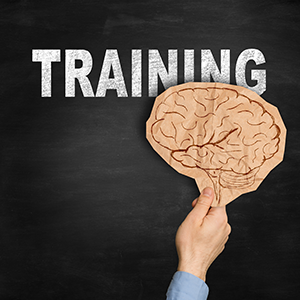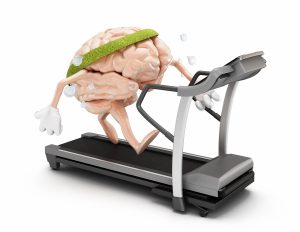Mental Sweat
“Mental Sweat”
LearningRx Trainers Add Intensity to your Brain Workout
 By Christina Ledbetter, PhD
By Christina Ledbetter, PhD
DOES BRAIN TRAINING WORK?
You wonder. We ponder. Our experts agree that under certain conditions, brain training works! The challenge in the brain training field is to find which of the conditions are the most ideal. As Modern Brain Journal’s senior science editor and a clinical neuroscientist, I’m weighing in on the debate. Intensity is the driving force behind effective brain training. It’s very logical. If you want to gain physical endurance, you exercise with intensity. If you want to gain brain function, you exercise your brain with intensity. Programs that train with intensity see the greatest results.
“Intensity is the driving force behind effective brain training.”
So what makes a brain training program intense? It might be possible but most certainly very difficult to create intensity with a computer game. Instead, I suggest that a clinician trained to deliver targeted mental exercises is best suited for creating the intensity needed to drive neuroplasticity—or the brain’s capacity to change with targeted experience. Existing research on computer-based brain training programs just isn’t strong enough yet to convince me that it drives neuroplasticity. Are those games fun and engaging? Absolutely! Should you play them to keep your brain active? Sure. But when you’re ready to address deficits in your thinking such as poor working memory and slow processing speed, you need a trainer to guide and direct that process.

ONE-ON-ONE BRAIN TRAINING
Research on clinician-delivered brain training is just now emerging. Since 2015, there have been less than 10 studies published on brain training interventions that are delivered one-on-one by a human being. Five of those studies were conducted on a program called ThinkRx, a clinician-delivered brain training program offered at LearningRx and BrainRx centers around the world. In the centers, brain trainers use more than 200 training procedures to remediate weak cognitive skills. They use a timer and metronome to increase the intensity of training sessions and limit mental breaks. They meet with each client several times a week for a minimum of 40 sessions, incorporating key elements such as sequencing, loading, and immediate feedback. And, of course, “high 5’s” for motivation!
University researchers who studied the ThinkRx method found significant changes in multiple cognitive skills including working memory, long-term memory, visual and auditory processing, processing speed, reasoning, and even increased overall IQ score! 1-5 Ongoing research on ThinkRx is documenting changes in the brain visible on MRI as well, including increased neuronal connections for participants with traumatic brain injury, mild cognitive impairment, and learning struggles. Researchers have also collected a wealth of evidence showing real-life changes including increased self-confidence, academic and sports performance, and improved mood.

“Trainers create a ‘mental sweat.’ That’s the condition in which we find brain training most effective.”
I’ve been on the research team for many of the ThinkRx studies and always go back to my explanation of intensity when talking about why the program works, saying, “It’s the intensity of LearningRx that impresses me the most about the program. We see these great results because we train intensely.” As a neuroscientist, I am always looking for what I call the mechanism of change—or why an intervention works. In the case of intense brain training, the reason is the release of an important chemical called brain derived neurotrophic factor, or BDNF. BDNF is like fertilizer for the brain, helping it form new connections between neurons. If intense physical exercise increases this chemical in the brain, intense mental exercise should, too!
The trainer is the key element in creating intensity. Not only can a trainer keep the pace of the training session rigorous, he or she can adapt the session to keep the client motivated, challenged, and working just below their level of failure. If you’re playing a computer game and get frustrated, what do you do? You turn it off. A trainer can push you through your frustration and keep you engaged. Trainers create a ‘mental sweat’. That’s the condition in which we find brain training most effective. MBJ

KEY INGREDIENTS OF EFFECTIVE BRAIN TRAINING
PRACTICED: Because brain training builds skills, it must be routinely practiced like learning to play tennis or the piano.
ONE-ON-ONE: Teaming with an experienced trainer provides accountability, motivation, and dynamic feedback.
INTENSE: It requires concentrated repetitions to drill and train skills quickly.
TARGETED: Exercises need to address specific weak skills.
SEQUENCED: Small, challenging steps allow the trainer to incrementally challenge the client and keep them engaged.
LOADED: Tasks must be progressively loaded, incorporating multi-tasking for intensity and automaticity.
FEEDBACK: Instant, effective reinforcement and adjustments keep training focused and intense, and increase client self efficacy.
References
Jedlicka, E. (2017). LearningRx cognitive training for children and adolescents ages 5-18: Effects on academic skills, behavior, and cognition. Frontiers in Education, 2(62). doi: 10.3389/feduc.2017.00062 https://www.frontiersin.org/articles/10.3389/feduc.2017.00062/full
Carpenter, D., Ledbetter, C., & Moore, A.L. (2016). LearningRx cognitive training effects in children ages 8-14: A randomized controlled study. Applied Cognitive Psychology, 30(5). doi: 10.1002/acp.3257 http://onlinelibrary.wiley.com/doi/10.1002/acp.3257/full
Gibson, K., Carpenter, D., Moore, A.L., & Mitchell, T. (2015). Training the brain to learn: Beyond vision therapy. Vision Development and Rehabilitation, 1(2). http://www.covd.org/?page=VDR_1_2
Ledbetter, C., Moore, A.L., Mitchell, T. (2017). Cognitive effects of ThinkRx cognitive rehabilitation training for eleven soldiers with brain injury: A retrospective chart review. Frontiers in Psychology, 8(825). doi: 10.3389/fpsyg.2017.00825 http://journal.frontiersin.org/article/10.3389/fpsyg.2017.00825/full
Hill, O.W., Zewelanji, S., & Faison, O. (2016). The Efficacy of the LearningRx Cognitive Training Program: Modality and Transfer Effects. Journal of Experimental Education: Learning, Instruction, and Cognition, 84(3), 600-620. http://dx.doi.org/10.1080/00220973.2015.1065218
About the Author
 Dr. Ledbetter is a clinical neuroscientist at LSU Health Sciences Center in Shreveport, LA. She specializes in neuroimaging and surgical brain-mapping as well as brain-based pharmacology and toxicology. Cognitive rehabilitation research is her passion. [email protected]
Dr. Ledbetter is a clinical neuroscientist at LSU Health Sciences Center in Shreveport, LA. She specializes in neuroimaging and surgical brain-mapping as well as brain-based pharmacology and toxicology. Cognitive rehabilitation research is her passion. [email protected]


